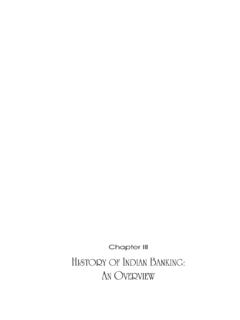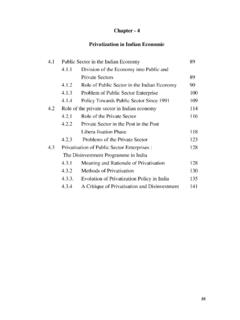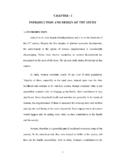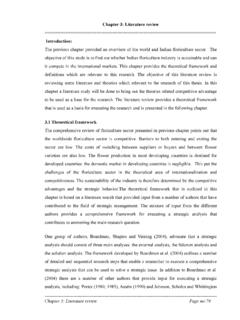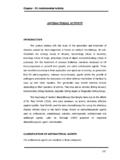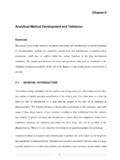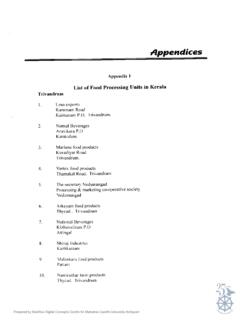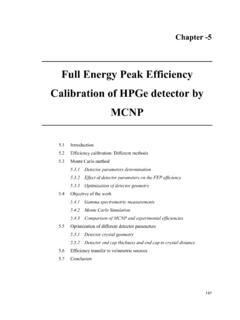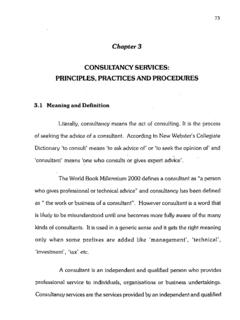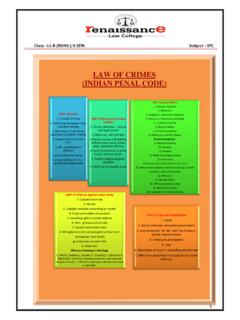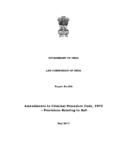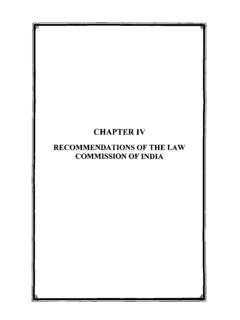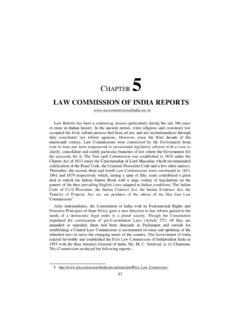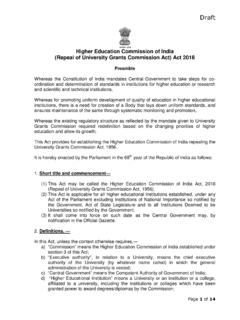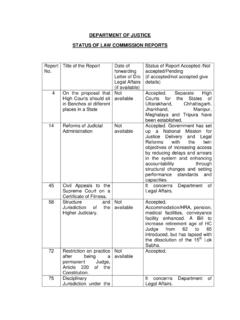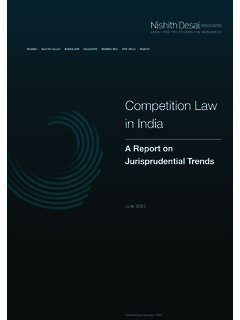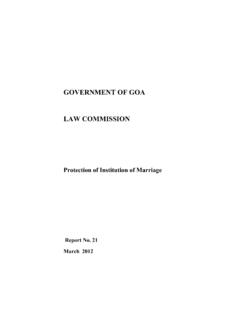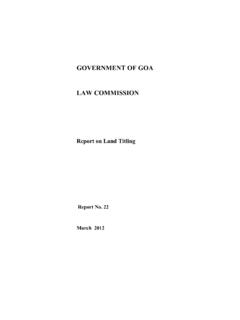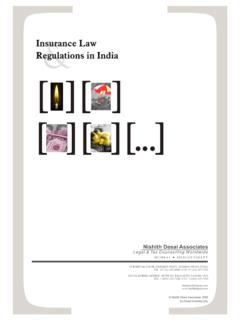Transcription of CHAPTER 4
1 CHAPTER 4 WITNESS PROTECTION: Legislative & Judicial Trends 75 CHAPTER -IV WITNESS PROTECTION: LEGISLATIVE AND JUDICIAL TRENDS Part A: LEGISLATIVE TRENDS Generally speaking, witness protection would imply protection to a witness from physical harm, but in the Indian context it has been given a restricted meaning. It has been understood to mean protection of witnesses from discomfort and inconvenience and, therefore, has had reference only to the provision of facilities. It is in this limited sense that witness protection was considered in the earlier reports of Law commission . EFFORTS TO IMPLEMENT WITNESS PROTECTION IN india (Commissions & Committees On Witness Protection) 14thIn the 14th Report of the Law commission Report of Law commission (1958) (Inadequate Arrangements For Witnesses) 1 inadequate arrangements for witnesses in the Courthouse, the scales of traveling allowance and daily batta (allowance) paid for witnesses for attending the Court in response to summons from the Court.
2 , witness protection was considered from a different angle. The Report referred to: This aspect too is important if one has to keep in mind the enormous increase in the expense involved and the long hours of waiting in Court with tension and attending numerous adjournments. Here the question of giving due respect to the witness s convenience, comfort and compensation for his sparing valuable time is 1 Law commission of india , Reform of Judicial Administration, 14th Report, First Law commission under the Chairmanship of Mr. M. C. Setalvad 1955-1958, in 1958 76 involved.
3 If the witness is not taken care of, he or she is likely to develop an attitude of indifference to the question of bringing the offender to justice. Fourth Report of the National Police commission (1980) (Handicaps Of Witnesses) Witness Protection in its narrow interpretation, and its impact on judicial administration, was also dealt with in the Fourth Report of the National Police Commission2 A prisoner suffers from some act or omission but a witness suffers for no fault of his own. All his troubles arise because he is unfortunate enough to be on the spot when the crime is being committed and at the same time foolish enough to remain there till the arrival of the police.
4 The Police commission referred to certain inconveniences and handicaps from which witnesses suffer. The commission referred to the inconveniences and harassment caused to witnesses in attending courts. The commission reproduced a rather critical and trenchant letter it received from a senior District and Sessions Judge. The learned judge gave a litany of grievances and complaints that a witness may have and then said that: Another aspect adverted to by the Police commission was the payment of daily allowance payable to witnesses for appearance in the Courts. The commission noted that the monetary compensation was woefully inadequate and referred to a sample survey carried out in 18 Magistrates Courts in one State, which revealed that out of 96,815 witnesses who attended the Courts during the particular period, only 6697 witnesses were paid some allowance, and that too after following a rather cumbersome procedure (which incidentally has hardly changed for the better anywhere).
5 These figures signify the irrelevance of the amount paid to witnesses for their troubles. Apart from this point made by the commission , these figures suggest the backbreaking burden on the Magistracy, in as much as each 2 National Police commission , 4th Report, 1980 77 Magistrate was expected to examine, on an average, about 5400 witnesses! Unfortunately, the length of the test period has not been given and so it may be difficult to comment further on these figures; but, whatever the period, the situation could not at all have improved since 154 thIn the 154th Report of the commission Report of the Law commission (1996) (Lack of facilities and wrath of accused ) 4 6.
6 We recommend that the allowances payable to the witnesses for their attendance in courts should be fixed on a realistic basis and that payment should be effected through a simple procedure which would avoid delay and inconvenience.. Adequate facilities should be provided in the court premises for their stay. The treatment afforded to them right from the stage of investigation up to the stage of conclusion of the trial should be in a fitting manner giving them due respect and removing all causes which contribute to any anguish on their part. , in CHAPTER X, the commission , while dealing with Protection and Facilities to Witnesses , referred to the 14th Report of the Law commission and the Report of the National Police commission and conceded that there was plenty of justification for the reluctance of witnesses to come forward to attend Court promptly in obedience to the summons.
7 It was stated that the plight of witnesses appearing on behalf of the State was pitiable not only because of lack of proper facilities and conveniences but also because witnesses have to incur the wrath of the accused, particularly that of hardened criminals, which can result in their life falling into great peril. The Law commission recommended: 3 Lokur, M. B., Access To Justice: Witness Protection and Judicial Administration , available at Necessary confidence has to be created in the minds of the witnesses that 4 Law commission of india , The Code of Criminal Procedure, 1973 (Act No.)
8 2 of 1974), 154th Report, Fourteenth Law commission under the Chairmanship of Mr. Justice K. J. Reddy 1995-1997, in 1996 78 they would be protected from the wrath of the accused in any eventuality. 7. Listing of the cases should be done in such a way that the witnesses who are summoned are examined on the day they are summoned and adjournments should be avoided meticulously..The courts also should proceed with trial on day-to-day basis and the listing of the cases should be one those lines. The High Courts should issue necessary circulars to all the criminal courts giving guidelines for listing of cases.
9 The following points emerge from the above recommendations: a) Realistic allowance should be paid to witnesses for their attendance in Courts and there should be simplification of the procedure for such payment. b) Adequate facilities should be provided to witnesses for their stay in the Court premises. Witnesses must be given due respect and it is also necessary that efforts are made to remove all reasonable causes for their anguish. c) Witnesses should be protected from the wrath of the accused in any eventuality. d) Witnesses should be examined on the day they are summoned and the examination should proceed on a day-to-day basis.
10 The Law commission did not suggest any measures for the physical protection of witnesses or even suggest how witnesses could be protected from the wrath of the accused . 172ndIn March 2000, the Law commission submitted its 172nd Report Report of the Law commission (2000) (Screen Technique) 5 5 Law commission of india , Review of Rape Laws, 172nd Report, Fifteenth Law commission under the Chairmanship of Mr. Justice B. P. Jeevan Reddy 1997-2000, in 2000 on Review of Rape Laws . The Law commission took the subject on a request made by the 79 Supreme Court of india (vide its order dated 9th August, 1999, passed in Criminal Writ Petition (No.))
